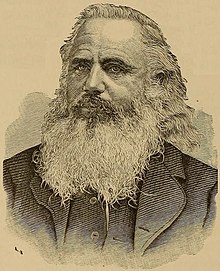William W. Davies
| William W. Davies | |
|---|---|
 | |
| Founder of the 'Kingdom of Heaven' | |
| 1867 – 1881 | |
| Personal details | |
| Born | August 9, 1833 Eglwysfach county, Denbigh, Wales |
| Died | November 26, 1906 (aged 73) Walla Walla County, Washington, United States |
| Resting place | Lyons Creek Cemetery 46°04′31″N 118°09′28″W / 46.0754°N 118.1579°W |
William W. Davies (August 9, 1833 – November 25, 1906) was the leader of a Latter Day Saint schismatic group called the Kingdom of Heaven, which was located near Walla Walla, Washington from 1867 to 1881.
Davies was born in Eglwysfach county of Denbigh, Wales[1][2] to a Methodist family.[3] In 1847, he converted to Mormonism[3] and in 1854–55 he emigrated to Utah Territory as a Mormon pioneer to join the gathering of the members of The Church of Jesus Christ of Latter-day Saints (LDS Church).[2] In 1857, Davies became disillusioned with the leadership of the LDS Church after the Mountain Meadows massacre, and he became a follower of the schismatic leader Joseph Morris.[2]
After the 1862 Morrisite War, Davies moved with a number of Morrisites to Deer Lodge County, Montana.[2][3] While in Montana, Davies had a series of revelations which instructed him to establish the "Kingdom of Heaven" near Walla Walla, Washington. Davies and forty of his followers moved there in 1866 and established a communal society on 80 acres. Davies held legal title to all property of the Kingdom of Heaven.[2][3]
Davies's main departure from mainstream Mormonism was his teaching of reincarnation. He taught his followers that he was the archangel Michael, who had previously lived lives as the biblical Adam, Abraham, and David.[3] When his son Arthur was born on 11 February 1868, Davies declared that the infant was the reincarnated Jesus Christ;[2][3] the child came to be called "Walla Walla Jesus".[4] After the announcement, the size of Davies's followers doubled;[3] most of the new converts came from San Francisco, California and Portland, Oregon.[4] When Davies's second son, David, was born in 1869, he was declared to be God the Father.[2][3]
The Kingdom of Heaven began to collapse in 1880, when both Davies children died of diphtheria. Some of Davies's followers sued him and won a $3200 judgment against him. As a result, Davies was forced to sell the Kingdom's property, which essentially brought the Kingdom to a close.[2][3][4] At the time of its break-up, there were 43 members of the group.[2] Davies moved to Mill Creek, Washington and briefly attempted to revive his following, but eventually gave up and moved to San Francisco, California.[2][3]
See also
Notes
- ^ Gilbert, Frank T. (1882). Historic sketches of Walla Walla, Whitman, Columbia and Garfield counties, Washington Territory, and Umatilla County, Oregon. by Frank T. Gilbert Historic sketches of Walla Walla, Whitman, Columbia and Garfield counties, Washington Territory, and Umatilla County, Oregon. Portland, Oregon: Printing House of A.G. Walling. pp. 368–377. Retrieved 24 February 2014.
- ^ a b c d e f g h i j Robert S. Fogarty (2003). All Things New: American Communes and Utopian Movements, 1860–1914 (Lanham, Md.: Lexington Books) ISBN 0-7391-0520-5 pp. 50–51.
- ^ a b c d e f g h i j J. Gordon Melton (1996, 5th ed.). Encyclopedia of American Religions (Detroit, Mich.: Gale) ISBN 0-8103-7714-4 p. 565.
- ^ a b c James Matthew Morris and Andrea L. Kross (2004). Historical Dictionary of Utopianism (Lanham, Md.: Scarecrow Press) ISBN 0-8108-4912-7 pp. 76–77.
References
- Use dmy dates from July 2013
- 1833 births
- 1906 deaths
- American Latter Day Saint leaders
- Converts to Mormonism from Methodism
- Latter Day Saint leaders
- Mormon pioneers
- People from Walla Walla County, Washington
- Welsh emigrants to the United States
- Welsh Latter Day Saints
- Members of the Church of the Firstborn (Morrisite)
- Michael (archangel)
